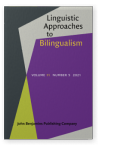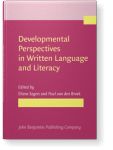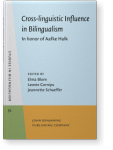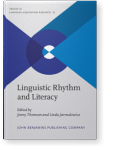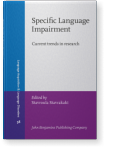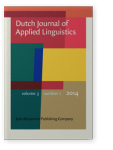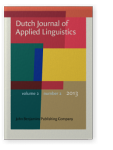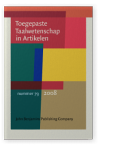Elise de Bree
List of John Benjamins publications for which Elise de Bree plays a role.
2021 Effects of bilingualism on statistical learning in preschoolers Linguistic Approaches to Bilingualism 11:5, pp. 611–639 | Article
Earlier work indicates that bilingualism may positively affect statistical learning, but leaves open whether a bilingual benefit is (1) found during learning rather than in a post-hoc test following a learning phase and (2) explained by enhanced verbal short-term memory skill in the bilinguals.… read more
2017 Can poor readers be good learners? Non-adjacent dependency learning in adults with dyslexia Developmental Perspectives in Written Language and Literacy: In honor of Ludo Verhoeven, Segers, Eliane and Paul van den Broek (eds.), pp. 315–331 | Chapter
This study aimed to test whether adults with dyslexia are impaired at non-adjacent dependency learning, and whether potential learning difficulties are domain-specific or not. Participants were familiarised with one of two artificial languages containing dependencies between the first and third… read more
2017 Past tense production in children with SLI and bilingual children: The influence of vocabulary and non-word repetition Cross-linguistic Influence in Bilingualism: In honor of Aafke Hulk, Blom, Elma, Leonie Cornips and Jeannette Schaeffer (eds.), pp. 259–278 | Chapter
We investigated whether (1) 7–9-year-old children with SLI, bilingual children (BIL) and monolingual (TD) children differed on Dutch past tense production of real and pseudo-verbs and (2) whether non-word repetition (NWR), receptive vocabulary, and group status contributed to past tense production.… read more
2016 Chapter 7. Word Stress Competence and Literacy in Dutch Children with a Family Risk of Dyslexia and Children with Dyslexia Linguistic Rhythm and Literacy, Thomson, Jenny and Linda Jarmulowicz (eds.), pp. 135–162 | Article
This study assessed Dutch word stress acquisition in children with (a familial risk of) dyslexia and normally developing children. Word stress production was measured through repetition of non-words with stress patterns varying in regularity. Both three-year-old children with a family risk of… read more
2015 Comparing SLI and dyslexia: developmental language profiles and reading outcomes Specific Language Impairment: Current trends in research, Stavrakaki, Stavroula (ed.), pp. 89–112 | Article
In light of the striking overlap in symptoms, it has been proposed that SLI and
dyslexia reflect the same underlying disorder, differing only in severity. An
alternative view is that SLI and dyslexia overlap (only) partially, sharing some
risk factors, and differing on various others. We will… read more
2014 Dutch and English literacy and language outcomes of dyslexic students in regular and bilingual secondary education Dutch Journal of Applied Linguistics 3:1, pp. 62–81 | Article
An increasing number of schools in the Netherlands offer bilingual (secondary) education, usually combining Dutch with English. As yet, it remains unclear whether students with dyslexia are able to cope in this type of educational setting. To address this question, the oral language and literacy… read more
2013 English spelling performance of Dutch grammar school students Dutch Journal of Applied Linguistics 2:2, pp. 152–169 | Article
The present study investigates English spelling performance of Dutch grammar school students to establish whether Dutch grammar school students are able to spell words differing in complexity, as well as whether they are sensitive to the information available in the spellings (phonological,… read more
2008 Nederlandse Baby's Gebruiken Statistische Informatie om Spraakklanken te Leren Onderscheiden Toegepaste Taalwetenschap in Artikelen 79, pp. 21–29 | Article
Phonemes are perceived categorically and this perception is language-specific for adult listeners. Infants initially are "universal" listeners, capable of discriminating both native and non-native speech contrasts. This ability disappears in the first year of life. Maye et al. (Cognition (2002))… read more
